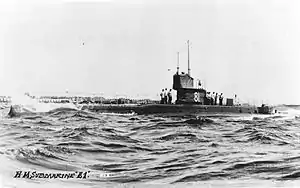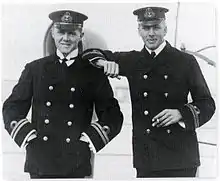HMS E1
HMS E1 (laid down as HMS D9) was a British E-class submarine that was built by Chatham Dockyard and cost £101,700. E1 was laid down on 14 February 1911. She was launched on 9 November 1912 and was commissioned on 6 May 1913. During World War I she was part of the British submarine flotilla in the Baltic.
 | |
| History | |
|---|---|
| Name: | HMS E1 |
| Builder: | HM Dockyard, Chatham |
| Cost: | £101,700 |
| Laid down: | 14 February 1911 |
| Launched: | 9 November 1912 |
| Commissioned: | 6 May 1913 |
| Fate: | Scuttled, 3 April 1918 |
| General characteristics | |
| Class and type: | E-class submarine |
| Displacement: |
|
| Length: | 178 ft (54 m) |
| Beam: | 15 ft 5 in (4.70 m) |
| Propulsion: |
|
| Speed: |
|
| Range: |
|
| Complement: | 30 |
| Armament: | 4 × 18 inch (450 mm) torpedo tubes (1 bow, 2 beam, 1 stern) |
Design
The early British E-class submarines, from E1 to E8, had a displacement of 652 tonnes (719 short tons) at the surface and 795 tonnes (876 short tons) while submerged. They had a length overall of 180 feet (55 m) and a beam of 22 feet 8.5 inches (6.922 m), and were powered by two 800 horsepower (600 kW) Vickers eight-cylinder two-stroke diesel engines and two 420 horsepower (310 kW) electric motors.[1][2] The class had a maximum surface speed of 16 knots (30 km/h; 18 mph) and a submerged speed of 10 knots (19 km/h; 12 mph), with a fuel capacity of 50 tonnes (55 short tons) of diesel affording a range of 3,225 miles (5,190 km; 2,802 nmi) when travelling at 10 knots (19 km/h; 12 mph), while submerged they had a range of 85 miles (137 km; 74 nmi) at 5 knots (9.3 km/h; 5.8 mph).[1]
The early 'Group 1' E class boats were armed with four 18 inch (450 mm) torpedo tubes, one in the bow, one either side amidships, and one in the stern; a total of eight torpedoes were carried. Group 1 boats were not fitted with a deck gun during construction, but those involved in the Dardanelles campaign had guns mounted forward of the conning tower while at Malta Dockyard.[1]
E-Class submarines had wireless systems with 1 kilowatt (1.3 hp) power ratings; in some submarines, these were later upgraded to 3 kilowatts (4.0 hp) systems by removing a midship torpedo tube. Their maximum design depth was 100 feet (30 m) although in service some reached depths of below 200 feet (61 m). Some submarines contained Fessenden oscillator systems.[3]
Crew
Her complement was three officers and 28 men.[3]
Service history

She worked with E5 and reconnoitered the Skagerrak as a prelude to sending submarines into the Baltic. Then on 15 October 1914, she and E9 sailed from Gorleston in a successful attempt to penetrate the German defences and enter the Baltic. On 18 October 1914, E1 unsuccessfully attacked the armoured cruiser SMS Victoria Louise in Kiel Bay. The torpedo ran too deep and missed.[4] On 30 July 1915, she torpedoed and sank the German minesweeper Aachen east-northeast of Oestergarhsholme, Germany.[5] On 19 August 1915, she torpedoed and damaged the German battlecruiser Moltke (23,000 tons) during the Battle of the Gulf of Riga.
E1's service ended on 3 April 1918 outside Helsingfors (now Helsinki), 1.5 nautical miles (2.8 km) off Harmaja Light in the Gulf of Finland. She was scuttled by her crew, along with E8, E9, E19, C26, C27, and C35 to avoid seizure by advancing German forces which had landed nearby.
Notes
- Akerman, P. (1989). Encyclopaedia of British submarines 1901–1955. p.150. Maritime Books. ISBN 1-904381-05-7
- "E Class". Chatham Submarines. Retrieved 20 August 2015.
- Innes McCartney; Tony Bryan (20 February 2013). British Submarines of World War I. Osprey Publishing. pp. 11–12. ISBN 978-1-4728-0035-0.
- Compton-Hall, pp. 137–138
- navypedia.org KAISERLICHE MARINE (GERMANY) Auxiliary mine destruction vessels of WW I
References
- Compton-Hall, Richard (2004). Submarines at War 1914–1918. Penzance: Periscope Publishing. ISBN 1904381219.
- Submarines, war beneath the waves, from 1776 to the present day, by Robert Hutchinson.
- The Royal Navy Submarine Service, A Centennial History, by Antony Preston.
- E 1 in hylyt.net (in Finnish)
- Finnish Submarines in Finnish Navy in World War II
